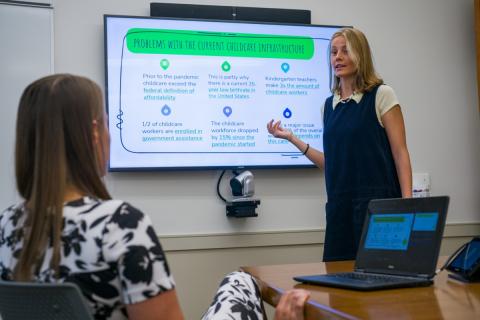How To Overcome the Daunting Task of Searching for a Mentor for REAP
Do you have a great research idea but no mentor?
Are you struggling to find the perfect mentor fit for your project?
Here is my story about how I found a mentor only one month prior to the research grant application deadline.
The Research Experience and Apprenticeship Program (REAP), a grant program through the Hamel Center for Undergraduate Research, requires that a first-year student be nominated by a faculty member and then work with a faculty mentor on a research project. In the fall of my first year at UNH, one of my professors agreed to nominate me for REAP, and I had a research idea to investigate how the COVID-19 pandemic has impacted women in the workforce. But I lacked just one thing, a faculty mentor to work with me on my research. My nominator could not be my mentor, because I would have needed to alter my research idea to one that was more in line with his expertise, such as learning about the relative elasticities of goods. However, I wanted to pursue the original project I had in mind because I had a passion to understand the problems that were currently hurting women in the workforce.

Unsure of how to find a mentor, I met with my advisor. I then emailed several different professors that my advisor recommended to me with the knowledge that I am a finance and economics major interested in studying women in the workforce. Several faculty members, many of whom were in the business department, replied to my email, and I then extended an explanation of my idea to them. I then realized my idea could also apply to faculty outside of the scope of the business department. One of the potential mentors was in the organizational behavior and management field and believed that my topic would be a good fit for her, so we decided to schedule a Zoom meeting to get to know each other more. I thought the work was mostly done after we had met via Zoom and that I had found a great fit for mentorship. This all took a turn, however, after the nomination form was due and we realized that one of the qualifications to be a REAP mentor was not met. The mentor must be available in the fall semester just after the summer of the REAP experience. Unfortunately, the mentor I had selected would be away on sabbatical that fall. It was then late January, and the application needed to be in by the end of March. It was back to the drawing board on the search to find a mentor, and the deadline was fast approaching.
At this point I almost gave up searching for a mentor and thought that I would be unable to complete the REAP application. However, I decided to try the Find Scholars feature on the UNH website, which the Hamel Center director Paul Tsang had suggested in the beginning of the application process when I had first met with him. It allowed me to search for professors who had done research in a field similar to what I was interested in, such as public policy and women in the workforce. I also decided to reach out to one of my first-year professors, Nina Windgätter of the philosophy department, because I had enjoyed taking her business ethics class and she had similar research experience. Dr. Windgätter agreed to become my mentor for the REAP experience after I emailed her explaining my research idea and set up a Zoom meeting to further explain my plan. However, if our class had been in person for that semester, I would have reached out during an office hour to pitch the research idea. After that I still had to overcome one slight hurdle. Dr. Windgätter was a lecturer, not a tenure-track professor. The University requires that departments approve any lecturers to be mentors for undergraduate research. The philosophy department gave approval, and I was able to move forward with the application.
Now that I had found a mentor, the rest of the application was quite simple. The HCUR website contained a to-do checklist along with a precise schedule. It had taken a lot of trial and error, but I had finally found a mentor that was a perfect fit for my project and I was able to submit the application on time. Despite the challenges, I am happy that I committed to the process of finding a mentor and was able to be successful with the REAP application.
If you are passionate about your research idea and the one step of undergraduate research you are concerned about is the search for a mentor, do not let that hold you back.
